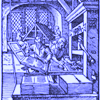
 Okay, so most readers won’t stumble over these links until well after Sunday brunch, but they’ll still be great for a rainy Sunday afternoon (if you’re on the East Coast) or even a Monday off. So, let’s dive right in…
Okay, so most readers won’t stumble over these links until well after Sunday brunch, but they’ll still be great for a rainy Sunday afternoon (if you’re on the East Coast) or even a Monday off. So, let’s dive right in…
There are 18 print-on-demand Espresso Book Machines worldwide, and 5 of them are in the Seattle area. Seattle Times writer/artist Gabriel Campanario provides an look into the dynamics of print-on-demand.
Rachel Gardner discusses some WordServe analysis of how online publicity efforts effect sales, and pointed my way to The Most Interesting Bookstores In The World. Nice. She also discusses why authors still need agents.
And if Rachel can’t convince you that you still need an agent, the Wall Street Journal digs into the reasons that publisher slush piles of unsolicited manuscripts are becoming a thing of the past. However, Brianna Goodspeed responds that this may not be true for everyone.
On the subject of agent slush piles, literary agent Janet Reid explains how slush still works, and what exactly slush means.
You know how good things come in threes? Well, Jessica at BookEnds tackles three topics dear to an aspiring writer’s heart: querying, submitting manuscripts, and avoiding scams. Kristin Nelson also serves up one, two, three excellent pieces on query letters.
Finally, a completely different Jessica at Dystel & Goderich points the way to a piece in A Public Space on Cairo’s up-and-coming writers, and a New Yorker article on Arabic novels in translation. Šukran jazílan!


